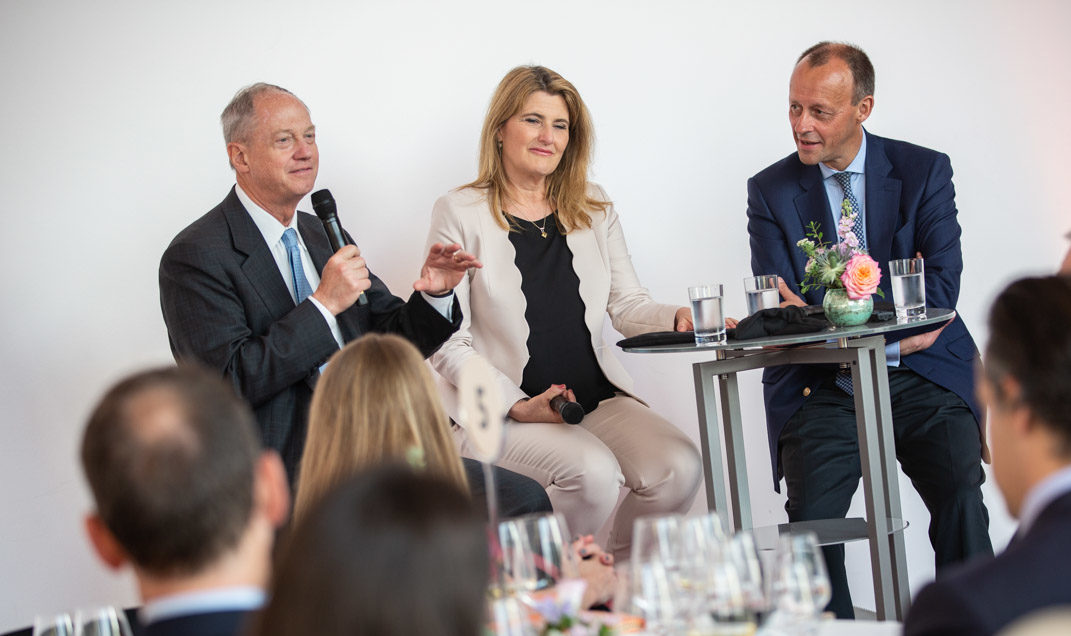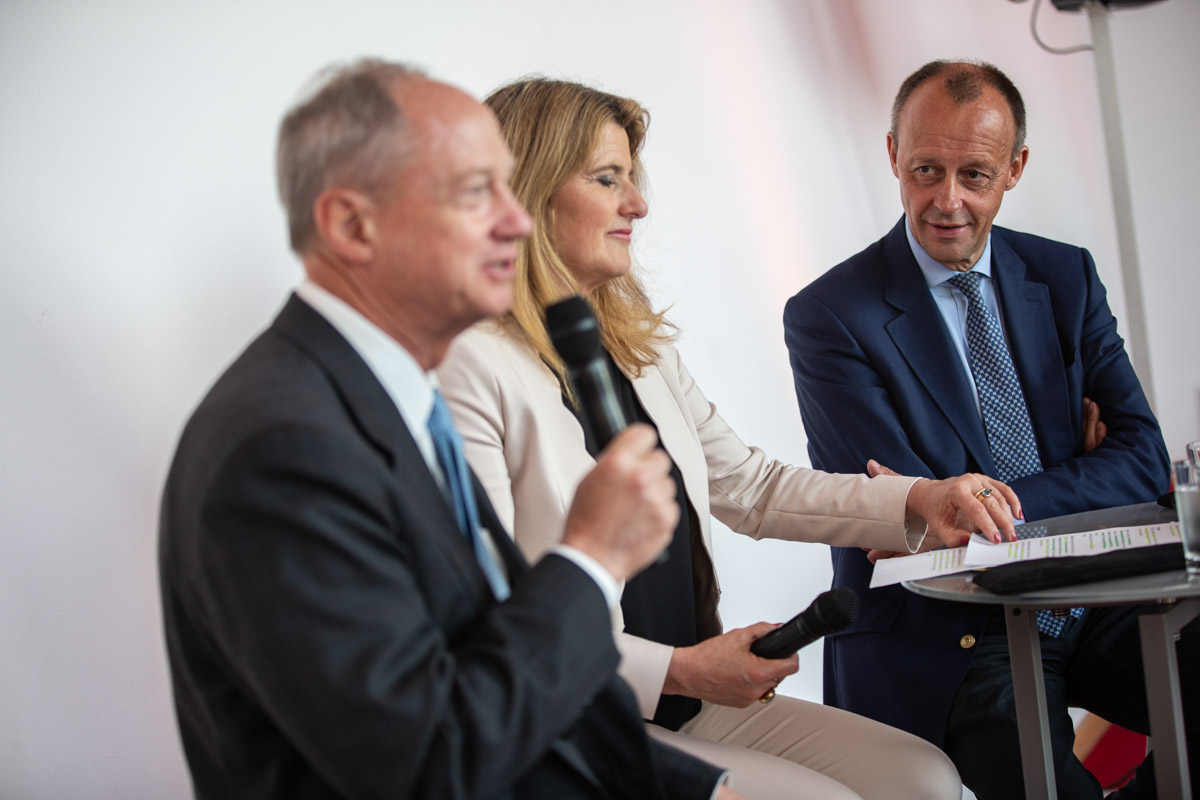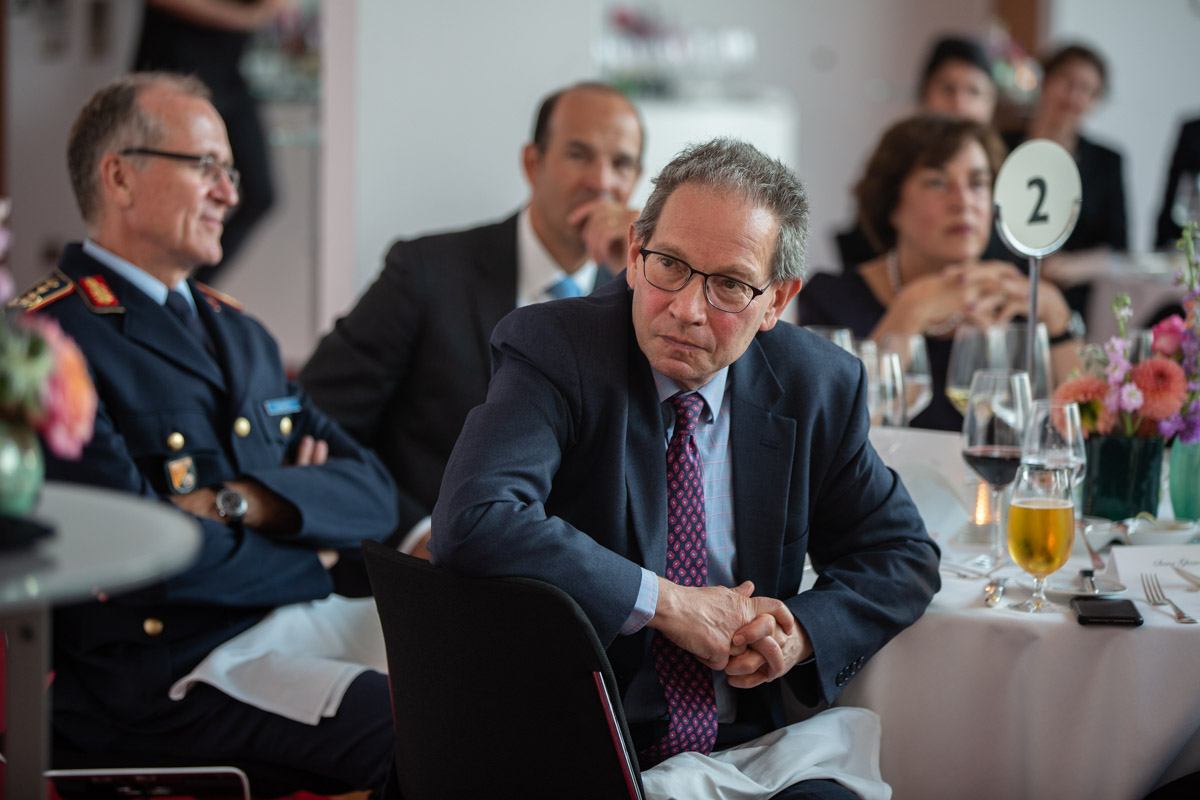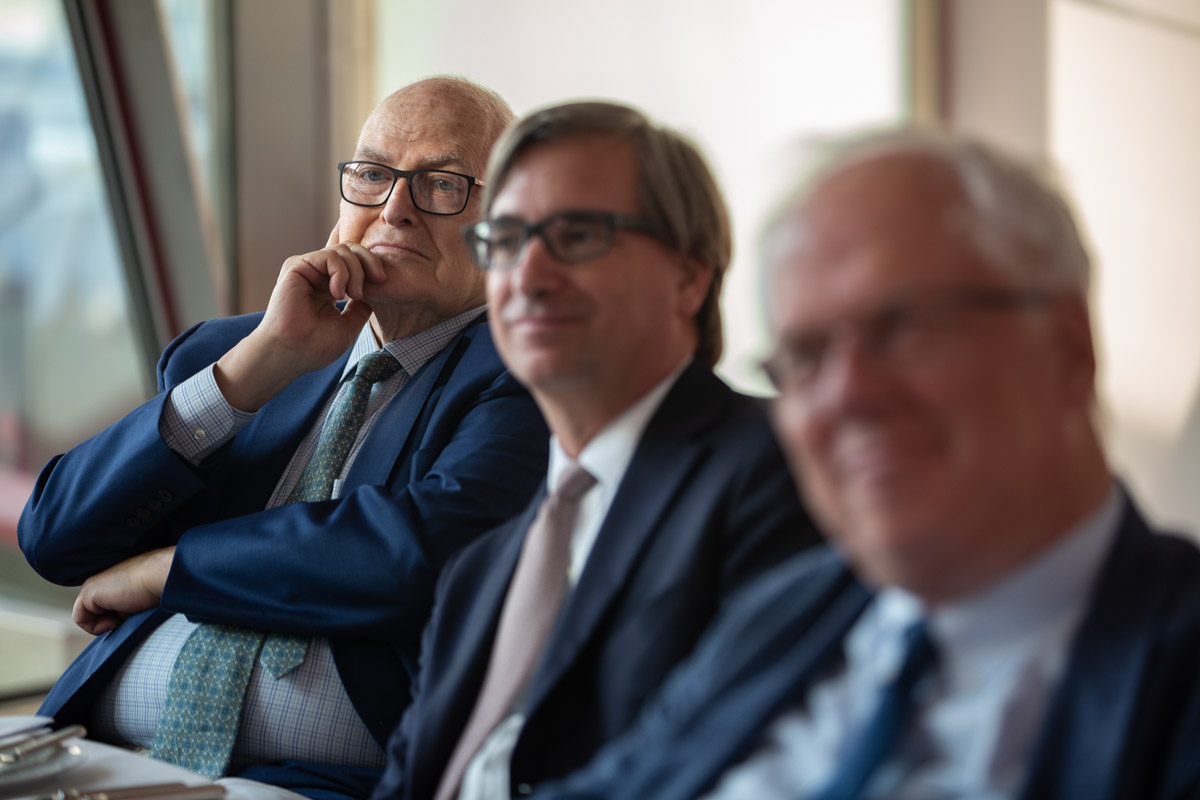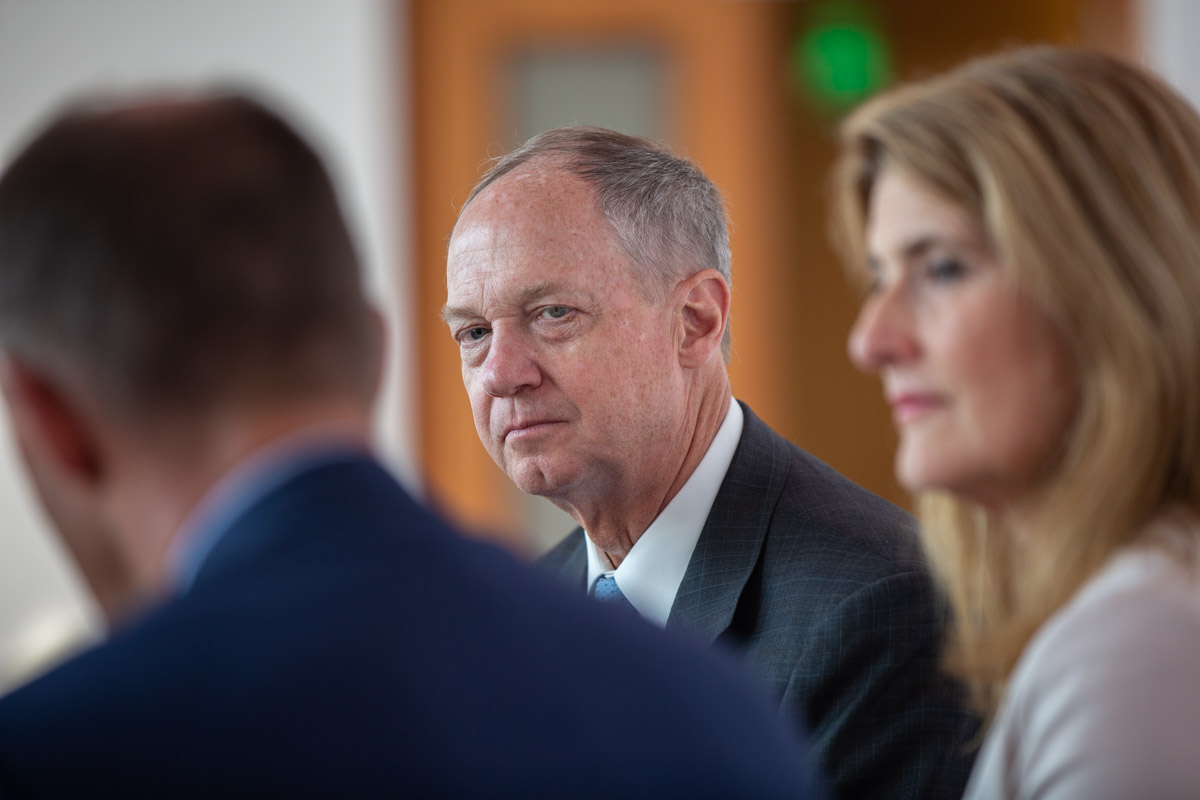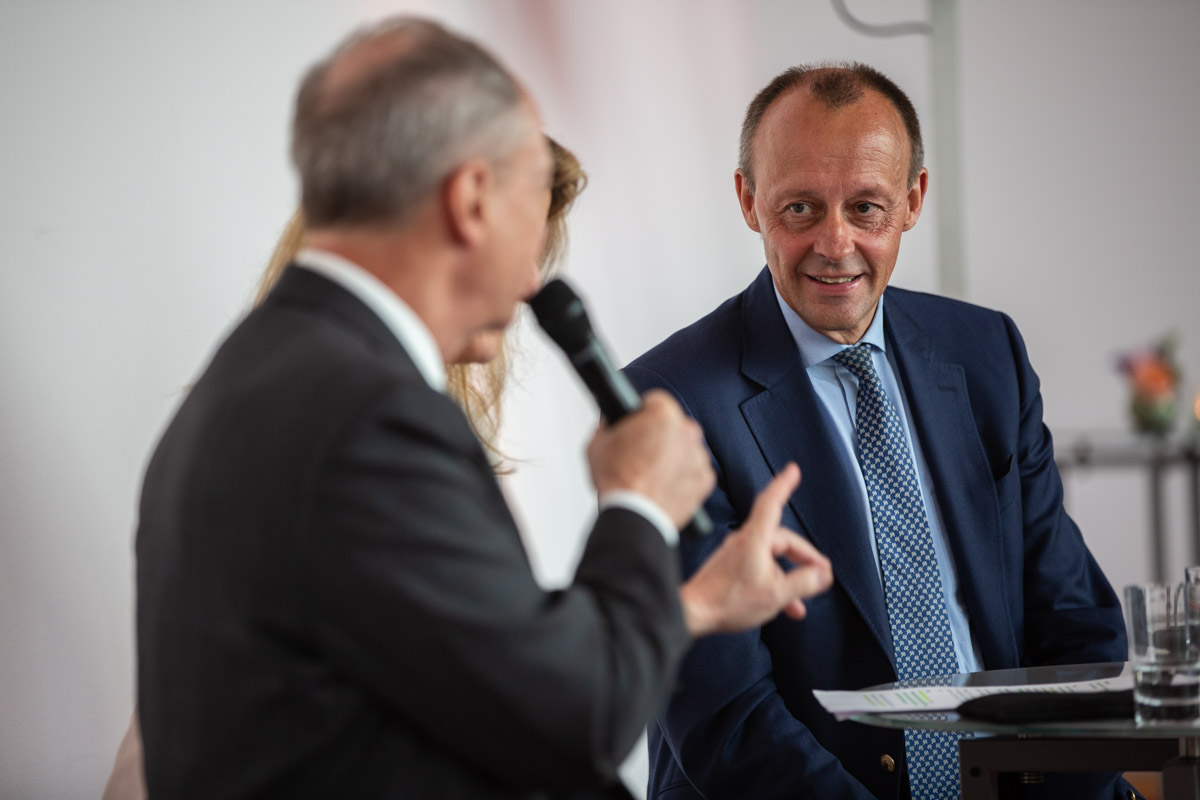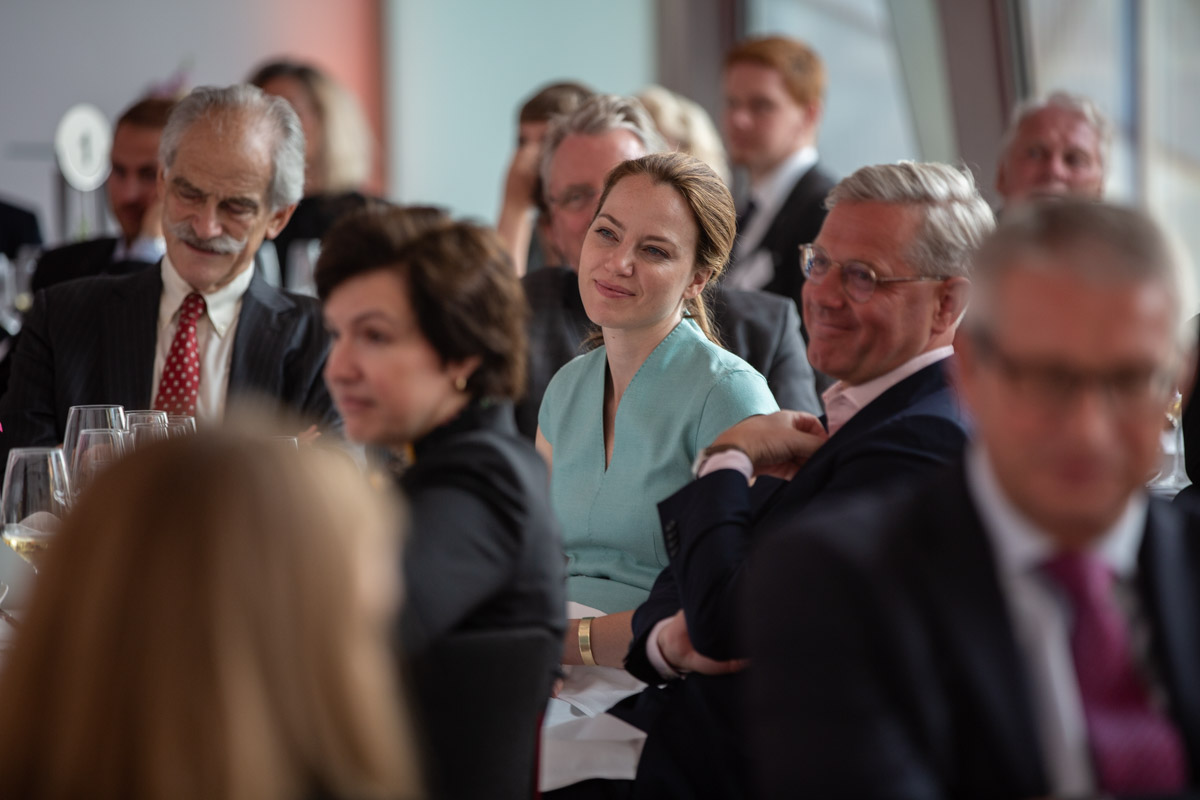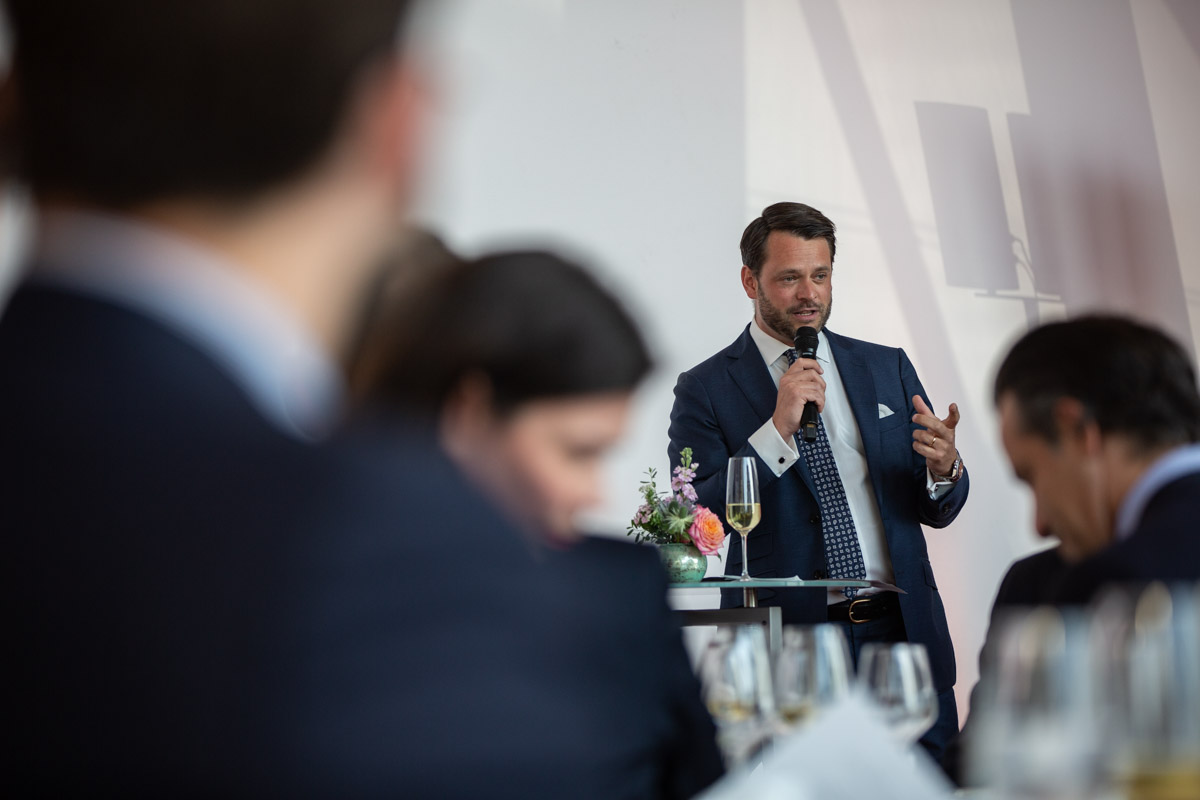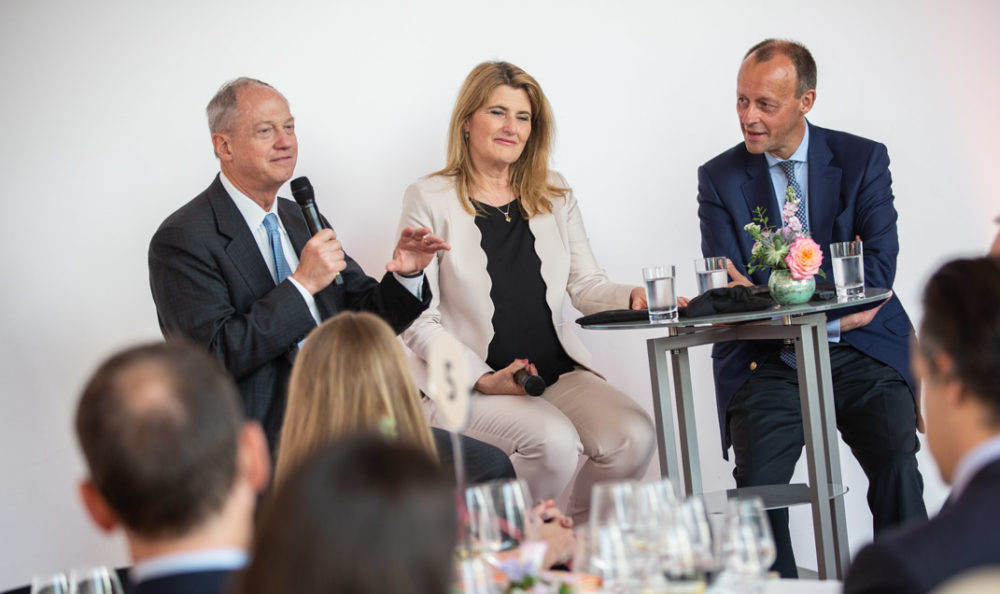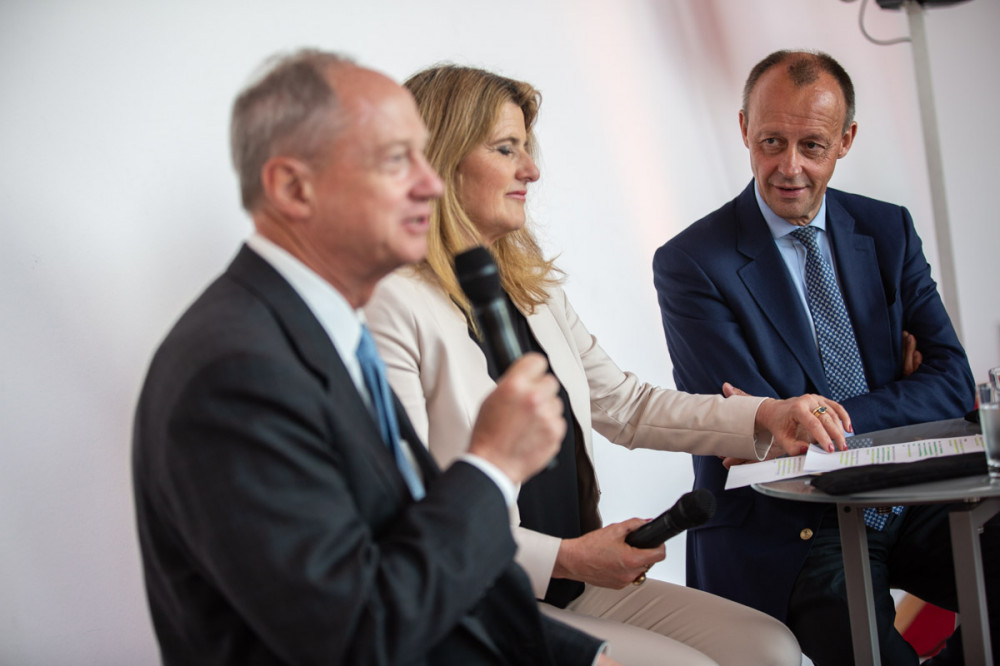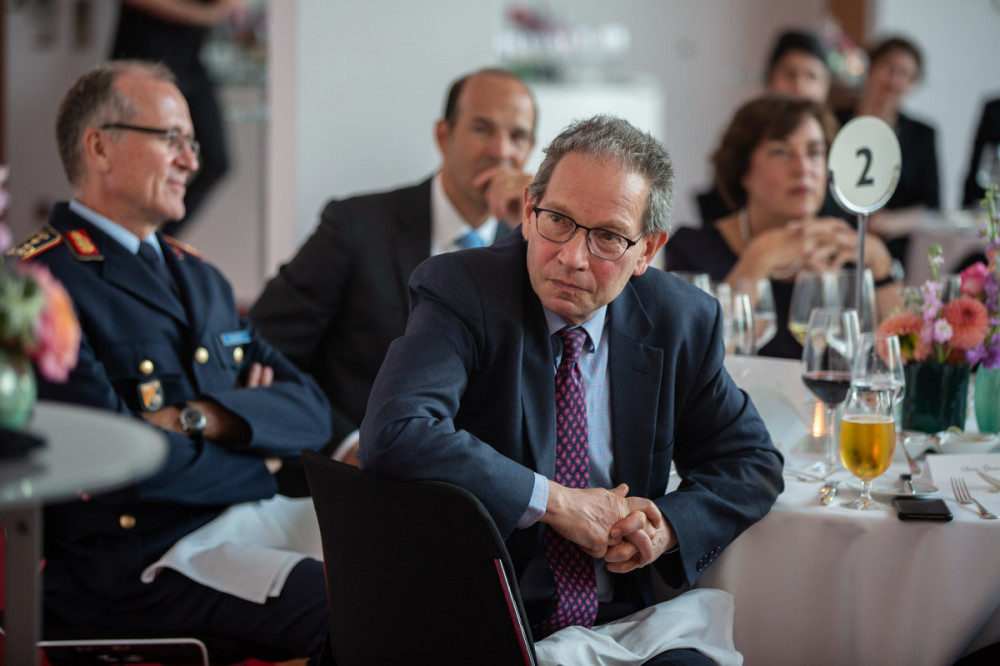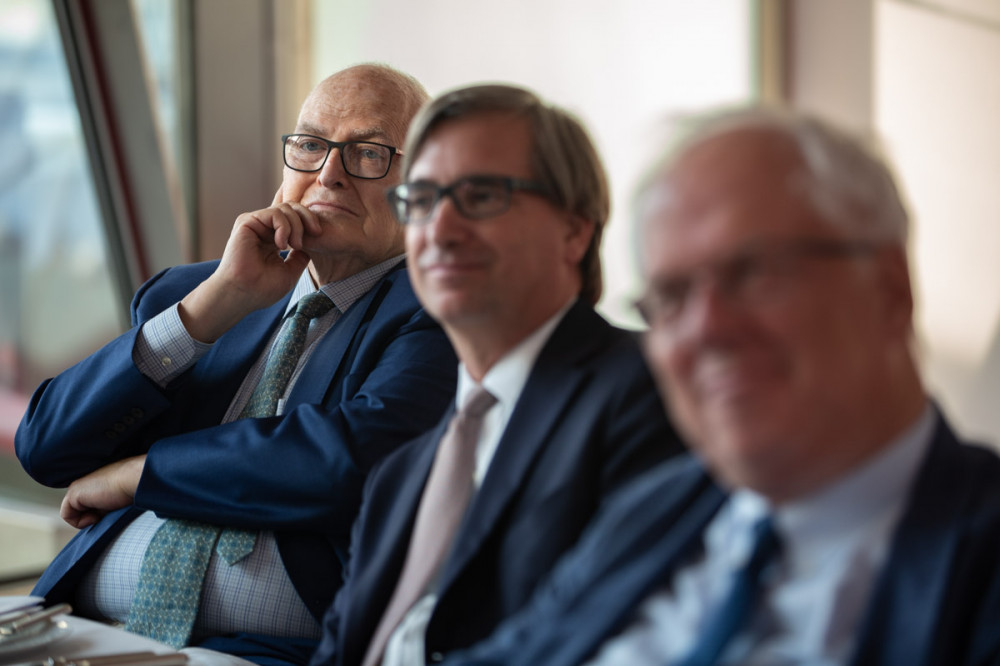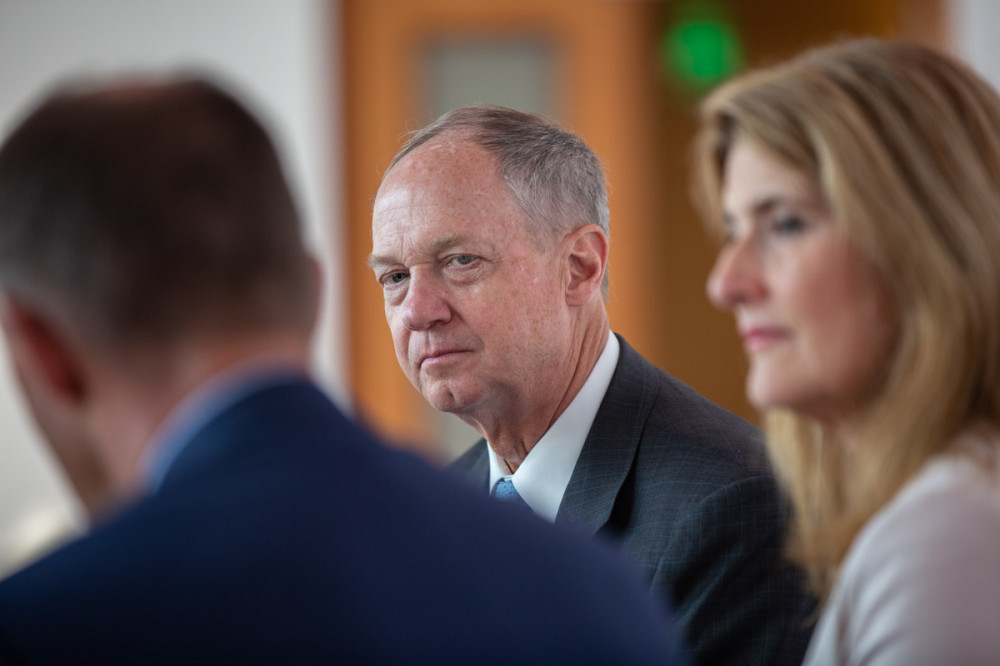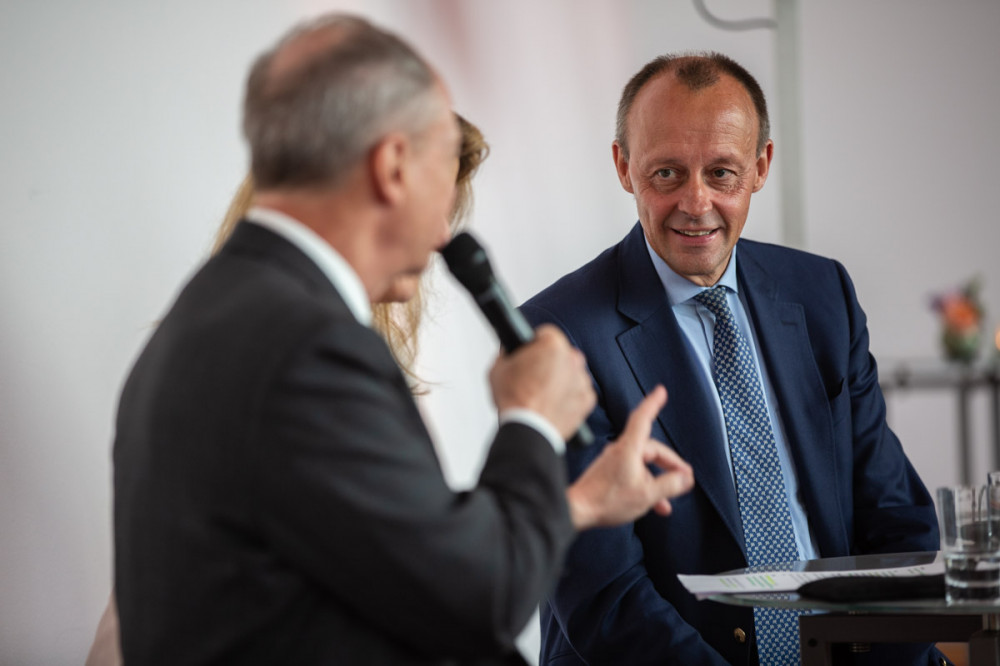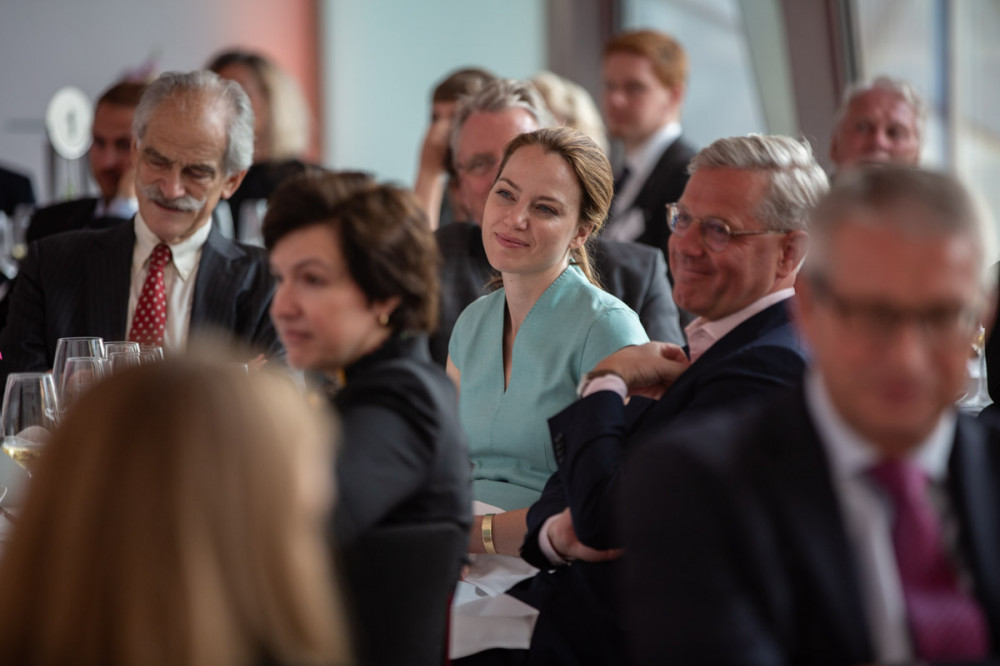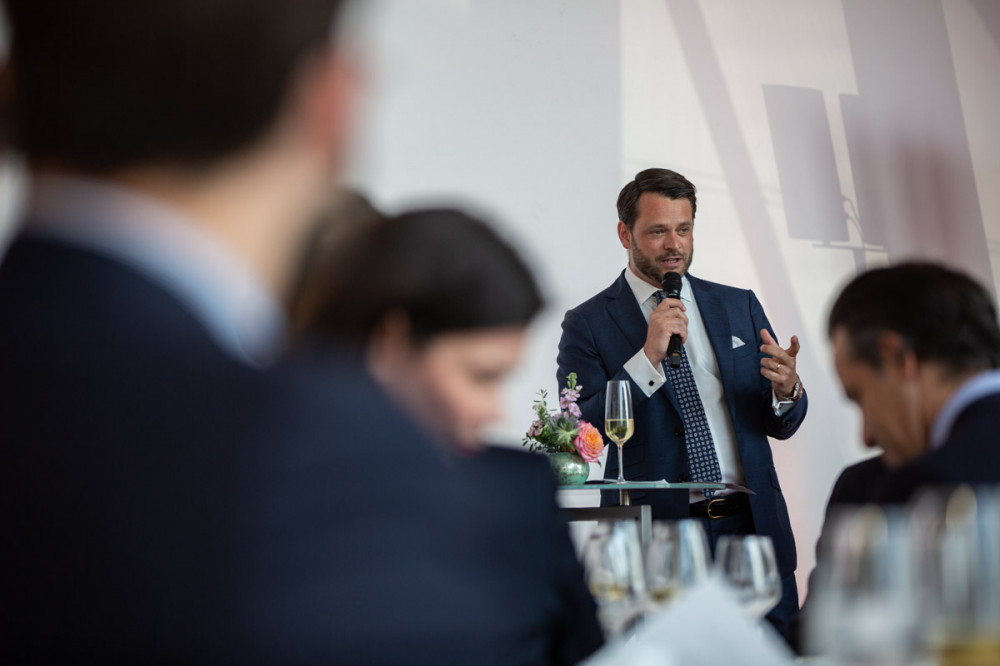Friedrich Merz und John Emerson im Gespräch
Friedrich Merz und John B. Emerson haben die Beziehungen zwischen Deutschland und den USA über mehrere Jahre in enger Zusammenarbeit mitgestaltet. Der Vorsitzende der Atlantik-Brücke und der frühere US-Botschafter in Deutschland und heutige Chairman des American Council on Germany blicken in diesem Interview zurück und schauen nach vorne.
It really is an era coming to an end. After ten years, Friedrich Merz as the chairman is leaving and John Emerson has already left – but not really. Let me start with you, dear Friedrich Merz. You are looking back on ten important and successful years. What was your biggest success, the most positive transatlantic event?
FM: First of all, I am really happy to co-host the biggest German-American Conference we ever had at Atlantik-Brücke together with the American Council on Germany (ACG) tonight and tomorrow. It is a great honor that we are attracting so many people to our conference. Sitting here and looking over to the Adlon Hotel, I am reminded of one of the best meetings I had in my capacity as chairman of the Atlantik-Brücke with John’s predecessor Bob Kimmitt. At the very beginning of my tenure, I invited him for dinner there. It was not an easy conversation because cooperation between the ACG and the Atlantik-Brücke had been a little fraught before. I said: Bob, let’s talk about what has happened and let’s look forward to what we can do jointly in the future. We came to the conclusion that we should leave the past behind and restore our cooperation. This was the continuation of a very fruitful collaboration between our two organizations, which we should make sure we continue in the future.
Which moment worried you the most?
FM: The biggest disappointment was the failure of TTIP. When I see what is happening in the US these days, I wish that we at least had TTIP. But to be honest, I am not so sure if this would really help as long as the American President is not willing to stick to the agreements the US government entered into. Nevertheless, we should come back to a rules-based cooperation between Europe and the United States. A transatlantic free trade agreement is one of the most important things we could and should achieve in the future. We all worked very hard on TTIP and we met in several places in Germany to fight for TTIP.
The biggest disappointment was the failure of TTIP.Friedrich Merz
John Emerson, you said the two of you were working together for six years. You were trying to achieve TTIP, and you are still true friends. Can you describe your cooperation and what is the key to this special friendship?
JE: I have to say what a great pleasure it is to sit up here and look into this room and see so many friends. Old friends, new friends, but particularly friends from our time in Germany. Secondly, I have to say, that there was probably no one I enjoyed working with in Germany more than Friedrich Merz. Friedrich hosted the opening dinner at which I spoke when I got introduced to some in this room and many in the German public the day I presented my credentials to President Gauck. And then literally the last speech that I gave and the last event that Kimberly and I and our girls attended, Friedrich hosted with Atlantik-Brücke again. He threw an incredible party for us. On behalf of all of us, we are really sad to see you go.
I have to say, that there was probably no one I enjoyed working with in Germany more than Friedrich Merz.Ambassador John B. Emerson
There are three levels to the German-American friendship and relationship. There is a government to government level – and sometimes there are things that we agree on and sometimes there are things that we don’t agree on. There is also the business to business level. There is no reason in the world that we cannot continue negotiating a great trade agreement. And then there is the people to people level, which is very much reflected by what we see tonight in this room.
Friedrich Merz, you recently said, and I quote you directly: We are eyewitnesses of a fundamental political and economic shift. You underlined that change while mentioning the election of the 45thU.S. President and the party convention of the Communist Party of China in October 2017. What exactly are these tectonic changes that we are facing?
FM: I mentioned a third date, which was the 23rdof June 2016, when the majority of the British decided Britain should leave the EU. These three events, the Brexit vote, the American election and the party convention of the Communist Party in China mark a fundamental change in our history. When we look back at these events some time from now, we will realize what really happened. Let me quote Professor Heinrich August Winkler, who said: We are in the midst of a cultural fight about the future of our liberal order. He concludes that it is really uncertain whether we will win. But there is something that makes me optimistic: when I travel to the United States, my experience is that in these complicated times, more Americans than ever before are willing to defend what we achieved over the last seven decades. Let’s preserve our freedom and our liberty.
These three events, the Brexit vote, the American election and the party convention of the Communist Party in China mark a fundamental change in our history.Friedrich Merz
John, what do you think about this?
JE: If you talk to most Americans and tell them that there is a real crisis in the German-American relationship, they say: What are you talking about? We love Germany. Angela Merkel still is probably, if not the most, one of the two most respected foreign leaders in the United States of America. The multilateral institutions that were created over the last 70 years, as creaky and in need of reform as some of them are, have been largely responsible for helping to create 70 years of peace and prosperity, growth and national security throughout the West. As we move away from working in and through those institutions towards a more transactional nation to nation approach, we risk moving away from the values that hold us together.
As we move away from working in and through multilateral institutions towards a more transactional nation to nation approach, we risk moving away from the values that hold us together.Ambassador John B. Emerson
John, Sigmar Gabriel, the possible next chairman of Atlantik-Brücke, said Europeans only care about themselves, for world issues they rely on the United States.Is this description true?
JE: Absolutely. President Obama got a lot of heat for an interview with The Atlantic, in which he talked about free riders in terms of the whole burden sharing concept. In fairness to Sigmar Gabriel’s commentary on Europeans, Americans didn’t necessarily mind that we were running things. That wasn’t a role that the United States of America shrunk from, particularly during the Cold War. However, those issues that Friedrich talked about are significantly growing. Particularly in relation to China and to the rise of nationalist populism around the world that has much more of a cultural genesis than an economic genesis, particularly here in Europe where immigration is the jet fuel for that movement. Those are issues that we can confront best when we are working together.
Friedrich Merz, you are one of the voices who constantly mentions that, let me put it in my words, Germany is punching below its weight. Where exactly should Germany step up?
FM: It is not only the Trump administration which is complaining about our defense budget. When former defense secretary Robert Gates left office, he gave a public speech on the deficit of funding and the NATO budget. Still, the majority of Germans is not aware of the fact that the U.S. is paying 70 percent and that Europe is only contributing 30 percent to the NATO budget. On the other hand, the question is: What is the right answer from the European side of the Atlantic to these challenges we are facing? The bigger problem within the transatlantic relationship is on our side of the Atlantic. The member states of the European Union have to start speaking with one voice.
The bigger problem within the transatlantic relationship is on our side of the Atlantic.Friedrich Merz
Can you give us an example?
FM: When Jean-Claude Juncker travelled to Washington, D.C. in July of 2018 and had a debate with President Trump in the Oval Office, he gave a very clear statement about trade. He could only convince the President not to implement more tariffs on European goods because he had a letter signed by 28 European heads of state backing his point. Europe has to be clearer and we have to be united. That brings me to another point: The Germans have to take on more leadership within the European Union. Germany has a big responsibility to bring all Europeans to the table to agree on a common European position.
Germany has a big responsibility to bring all Europeans to the table to agree on a common European position.Friedrich Merz
Do you agree with that, John?
JE: That’s a very fair statement. Thinking about the effort to get the EU member states agree on sanctions against Russia as consequence of the illegal annexation of Crimea and the invasion of Ukraine, I do recall Angela Merkel being very insistent on making sure everybody is lined up. But we were constantly talking to Germans about investing more in the southern part of Europe where we have all this youth unemployment, and not worrying so much about the Schwarze Null in our budget. If Germany does not take a lead in investing in national security and in other areas, no other country is going to do it.
If Germany does not take a lead in investing in national security and in other areas, no other country is going to do it.Ambassador John B. Emerson
In 2015, Atlantik-Brücke presented President Bush Senior with an award. You, Friedrich Merz, were invited to Bush’s house in Kennebunkport, Maine. Please share those moments and describe why exactly you awarded President George H. W. Bush.
FM: That was one of the most moving events in my tenure at Atlantik-Brücke. We had a very long Saturday in their private home in Kennebunkport. It was very encouraging to see that the President was still very interested in Germany. We had a deep conversation on German reunification and the events that led up to it. He was very interested in hearing how the country is governed from Berlin now, a city which was very close to his heart because of its history.
JE: At least Germans of a certain age never ever forget that the man is absolutely revered here. Angela Merkel did not go to his funeral because of protocol. She went to his funeral because she wanted to be there.
Talking about the future, we have to jumpstart a dialogue with the America of tomorrow. The majority of the Americans soon won’t have European roots. What would you recommend, how can we start this dialogue?
JE: We underestimate the impact and the importance of youth. When you see the impact of the kids in Florida, who were the survivors of that school shooting or when you see the girl from Sweden who’s led the grassroot effort on climate change, it actually gives me great hope. For organizations like us both having Young Leaders programs, we have to keep building on this asset and maintaining it. We ought to empower our young people more and to listen to them more.
We underestimate the impact and the importance of youth.Ambassador John B. Emerson
We will come to an end. Chancellor Merkel said in her commencement speech recently at Harvard University, I quote: Nothing can be taken for granted, democracy is not something we can take for granted, neither is peace, neither is prosperity. What should we do to fight for these shared values?
FM: The most important point is to show people in our respective countries that we are still sharing these values. I would like to give you one clear indication that this is really working. We are going to the US with our annual delegation in October every year. Last year we went to Oklahoma, a state where we had never been to before. The people there were so enthusiastic about the German-American cooperation and their hospitality was outstanding. It’s quite simple: People have to meet people.
What can you add, John?
JE: Living in Los Angeles, which is Berlin’s sister city, I couldn’t agree more with that. Look at the Paris climate change agreement for example. The reality is: We are actually doing quite well. Because the state level, the local level, the business level and the people to people level are realizing this plan. The federal government isn’t that important. And that can happen on issue after issue. Additionally, democracy and the values that we hold dear are like a marriage – you’ve got to work on it. You have to always be thinking about it, you have to be flexible and willing to grow and change. I want to give a shout-out to the members of the press, because you are having a tough experience in today’s world. The fact is, it is your responsibility to hold the rest of us accountable to live up to the values that we claim we are living up to.
I want to give a shout-out to the members of the press, because you are having a tough experience in today’s world. The fact is, it is your responsibility to hold the rest of us accountable to live up to the values that we claim we are living up to.Ambassador John B. Emerson
This conversation was moderated by Tina Hassel who is the Berlin Bureau Chief of ARD German Television.

